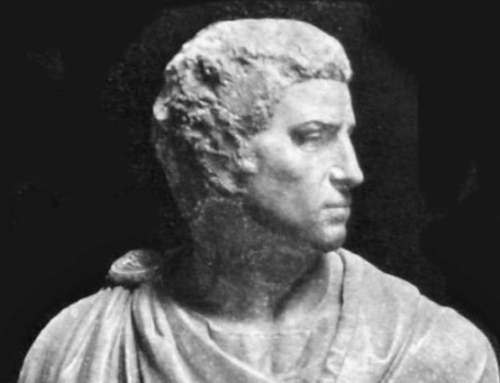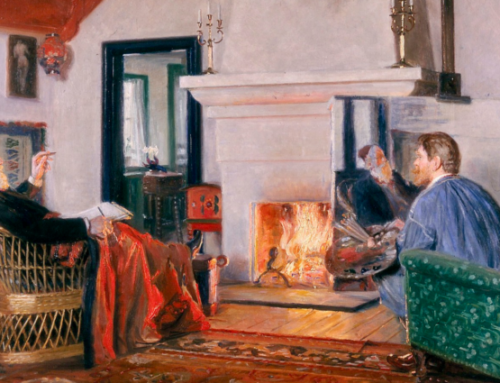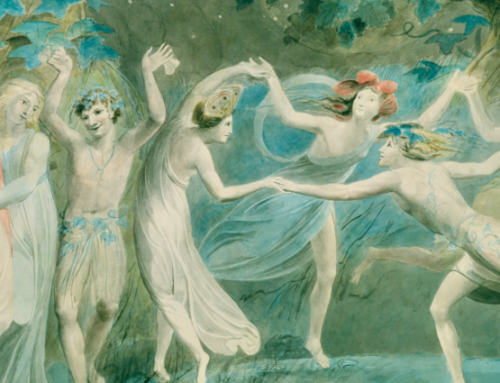Despite the number of times the witches repeat “Fair is foul, and foul is fair,” Macbeth testifies to the objectivity of natural law and universal knowledge of good and evil known to conscience and written on the heart and mind of all persons…
In the culture of sixteenth-century Europe that witnessed revolutions in geography with old maps revised to include the continents of North and South America, in astronomy with the Copernican theory replacing the Ptolemaic worldview, and the Protestant Revolt dividing the oneness of the Catholic faith into new sects and denominations like Lutheranism, Calvinism, and Anglicanism, the ideal of truth as one, universal, and eternal for all times, in all places, and for all people suffers fragmentation and division. The notion of truth as relative summarized in the phrase repeated in Gulliver’s Travels (“Different nations have different customs”) gains credibility and supplants the moral consensus of the classical-Christian tradition and the Perennial Philosophy. Montaigne’s autobiographical Essays that explore his thoughts, feelings, and moral judgments on a multitude of topics portray a modern, subjective idea of conscience that does not acknowledge sin, show contrition for wrongdoing, make reparation, or seek forgiveness or absolution.
In “On Repentance” Montaigne remarks that “I rarely repent, and that my conscience is content with itself” and “I have my own laws and my own court to judge me, and I refer to these rather than elsewhere.” While he expresses regret for some choices and behaviors that caused grief or pain, he does not consider this dissatisfaction contrition for weakness, folly, or sin. They are merely mistakes: “But I should not, I think, give the name of repentance to this, any more than I should to my dissatisfaction at not being an angel or a Cato.” Rather than accept moral responsibility for unfortunate outcomes or moral failures, Montaigne blames circumstances out of his control or attributes the outcome to Fortune: “I do not reproach myself for this; I blame my fortune, not my performance.”
He finds himself innocent of malice, envy, revenge, or theft, and he does rely on others for praise or blame “in such corrupt and ignorant an age as this.” Only he possesses the whole truth about his moral state, and only he has the authority to blame or exonerate his actions: “None but you know whether you are cruel and cowardly. Others have no vision of you, but judge of you by uncertain conjectures…. Do not rely on their opinions, therefore; rely on your own.” Montaigne’s view of conscience, then, is subjective, relative, and individualistic. No divine commandments, higher authority, or eternal or natural law form the basis of objective standards to determine the virtue or vice of his choices and actions. In short, Montaigne suffers no guilt for any misdeeds that trouble his conscience and does not refer to any of his faults as mortal, venial, or deadly sins that require confession or reparation: “My actions are controlled and shaped to what I am, and to my condition of life. I can do no better.”
In Shakespeare’s Macbeth, Macbeth and Lady Macbeth act as if conscience does not exist or as if they can silence or ignore it as a judge. In plotting the murder of Duncan in their castle to gain the kingship of Scotland, husband and wife scheme to slay the king at night with a dagger and then accuse the chamberlains for the murderous deed by smearing blood on their hands during their sleep. When Macbeth hesitates before satisfying his “black and deep” desires and “vaulting ambition” for power, he hears the voice of his conscience. Duncan has just recently honored him with the title of Thane of Cawdor for heroism on the battlefield and deserves gratitude. Duncan is a just king who deserves the loyalty of his subjects, a kinsman who deserves the protection of family, and a guest in his home entitled to the law of hospitality practiced by civilized societies to welcome travelers.
When Macbeth hears his conscience forbidding the foul deed, he temporarily changes his mind and tells his wife to banish the thought from her mind: “We will proceed no further in this business.” As Macbeth wrestles with his conscience, Lady Macbeth accuses him of cowardice (“Art thou afeard to be the same in thine own act and valor / As thou wert in desire?”). She questions his manhood, as if conscience holds no authority and murder has no moral consequences. When Macbeth ponders the possibility of failure, Lady Macbeth scoffs at his lack of confidence and daring: “We fail? / But screw your courage to the sticking place / And we’ll not fail.” In her mind, conscience makes men foolishly fearful, interferes with men’s desire for greatness, and robs them of their boldness. Worldly success and the lust for power never achieve their purpose when men let conscience inform their decisions. She taunts her husband with the boast that she can be more ruthless than any man. She is not filled with “th’ milk of human kindness” like her timid husband. She will invoke evil spirits “to take my milk for gall” and “unsex” her from her maternal nature and fill her “from the crown to the toe top full / Of direst cruelty.” She boasts, taunts, and acts as if conscience holds no authority, as if man is not a moral agent, and as if guilt does not follow crime or sin and torment a person’s soul.
Heeding Lady Macbeth’s encouraging words to assert his manhood and seize power and ignoring the warning voice of conscience, Macbeth kills King Duncan in his sleep and presupposes the perfect crime carries no consequences or possibility of detection, assuming “this blow might be the be-all and the end-all here.” The perfect crime and the ingenious plot to implicate the drugged chamberlains with blood-stained hands as the assassins, however, do not proceed as planned. Macbeth’s conscience reacts instantly when he murders Duncan and the servants: “I could not say ‘Amen’ / When they did say ‘God bless us’.” Macbeth’s conscience suffers immediate horror and guilt over the monstrous evils that torment his soul and darken his intellect:
Methought I heard a voice cry ‘Sleep no more!
Macbeth does murder sleep’—the innocent sleep,
Sleep that knits up the raveled sleave of care….
Unable to say “Amen” and confessing “Macbeth shall sleep no more,” Macbeth can no more prevent guilt as the consequence of murder than he can stop blood as the effect of a wound, confessing “I am afraid of what I have done.”
Shocked by the blood on his hands, he witnesses the visible stain of the moral guilt that reveals his murderous deed, an act so abominably evil that “great Neptune’s ocean” can never wash the red from his hands. Although Lady Macbeth assures her husband that “a little water clears us of this deed,” the unnaturalness of Macbeth’s murder of king, kinsman, guest, and fellow human being conjures in his mind the picture of his bloody hands coloring the entire ocean: “No, this my hand will rather / The multitudinous seas incarnadine, / Making the green one red.” In addition to these reactions of guilt, shock, and sleeplessness, Macbeth suffers more anguish upon seeing the ghost of Banquo, killed by Macbeth’s hirelings: “Never shake / Thy gory locks at me.”
To protect his throne from Banquo’s sons, prophesied by the witches to be Macbeth’s successors, Macbeth perpetrates still more violence, only to discover once again that murder will out, that guilt follows sin, and blood flows from wounds. The conscience speaks. Guilt is real. Sin produces suffering. All these episodes testify to the objective reality of the conscience and its knowledge of good and evil known through the natural law written on the mind and heart of every person.
Lady Macbeth’s callous dismissal of conscience as a trivial consideration (“Consider it not so deeply”) or of blood as a small stain easily cleansed by “a little water” does not correspond to the terrifying reality of Macbeth’s tormented soul: “O full of scorpions is my mind, dear wife.” The brazen woman who boasted of her ferocity, claimed the fearlessness of a soldier’s courage, and renounced her maternal nature and feminine sensibility also discovers the tribunal of moral law—the hard truth that woman is not man any more than evil is good or “foul is fair” as the witches babble. The hardened heart that defied natural law and rejected her feminine nature with violent language like “Unsex me here” and that renounced motherhood by her willingness to kill a nursing baby (“I would, while it was smiling in my face, / Have plucked my nipple from his boneless gums / And dashed the brains out…”) confronts the fact of womanhood, the law of nature, and the reality of conscience. Like Macbeth’s symptoms of bloody hands, nightmares, ghosts, and sleeplessness that manifest guilt, Lady Macbeth’s sleepwalking and perpetual washing of her hands reflect her troubled soul—“a great perturbation in nature” that a doctor cannot cure.
Nature will out sooner or later, at night if not in the day. No matter her violent language and cruel heart, Lady Macbeth is not a soldier on the battlefield with a weapon but a woman with female sensitivity who reacts to spots (“Out, damned spot, out I say!”) and values cleanliness that eliminates all stains and smells (“Here’s the smell of the blood still”). Despite the number of times the witches repeat “Fair is foul, and foul is fair” as if things do not have an unchangeable fixed nature or operate according to self-evident truths, Macbeth testifies to the objectivity of natural law and universal knowledge of good and evil known to conscience and written on the heart and mind of all persons. Good and evil, beauty and ugliness, male and female, human being and animal, and God and man are not arbitrary categories, relative truths, or subjective feelings. Montaigne’s subjective idea of conscience—“I can do no better”—does not absolve sin or prevent tragedy. Moral truth does not reside in each person’s individualistic definition of conscience but in the objective authority of natural law and eternal law that transcends the glib rationalizations of the witches’ words repeating that foul is fair.
The Imaginative Conservative applies the principle of appreciation to the discussion of culture and politics—we approach dialogue with magnanimity rather than with mere civility. Will you help us remain a refreshing oasis in the increasingly contentious arena of modern discourse? Please consider donating now.







Leave A Comment